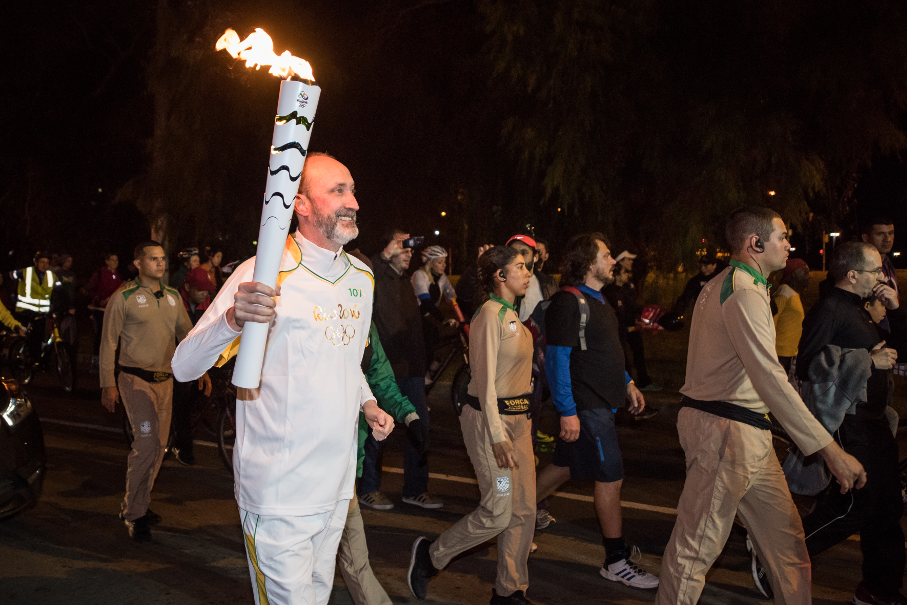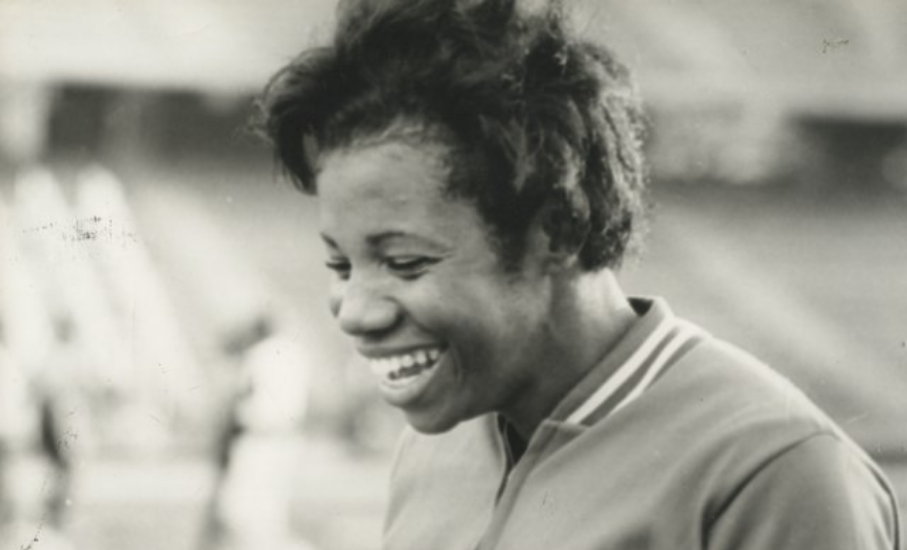The Games are just one facet of Olympism with many social issues underneath. Check out this selection of historical moments made by Professor Nelson Todt

Professor Nelson Todt carrying the Olympic Torch at the Rio Olympic Games in 2016/Photo: Bruno Todeschini
For the first time ever, the number of female athletes in the Olympic Games is almost equal to the number of male athletes. This Tokyo edition will also be marked by the unprecedented participation of a transgender athlete in a female category. Although, normally, the focus of the event is on the competitions, several social issues are evidenced in the practice of sports. The coordinator of Research Group in Olympic Studies of PUCRS, and president of Pierre de Coubertin Brazilian Committee, which is based at the University, Dr. Nelson Todt, explains the importance of the Games for the visibility of different social issues.
“The Olympic Games are the biggest sporting event in the world and they reflect the entire social context outside of it. Thus, when addressing social issues in such a major event, greater attention is given to these issues”.
In a partnership between the eMuseu do Esporte, PUCRS, UERJ, ACNur, Unesco and Unic Rio, the virtual exhibition Reflections Olympic and Human Dignity, on Olympic Games and inclusion through sport, will be launched in August. Check out a selection of moments, made by Professor Todt, highlighting a number of social issues and find out more about the virtual exhibition.

Aída dos Santos was the only woman in the Brazilian delegation at the 1964 Tokyo Olympic Games/Photo: Public Domain
The Olympic Games had their beginnings in Classical Antiquity. Back then, only Greek citizens could participate, that is, men born in the territory that we know today as Greece. In this context, in addition to not playing the games, women could not watch them live. Forgotten for years, the games saw an upsurge in popularity by the hands of Pierre de Coubertin, the founder of the Olympic Games of the Modern Era. Its first edition, in 1896, in the city of Athens, did not allow participation of women, either. However, women began to compete in the second edition, in 1900.
Despite this, it was only in 1991 that the inclusion of women’s categories in all sports became mandatory. In the following edition, in 1992, less than three out of ten athletes were women. This edition alone, in Tokyo, is almost gender-balanced. Currently, 48.8% of athletes are women. The next edition of the Olympiad is expected to have more women than this one.
In 1968, on the podium of the 200-meter competition, gold and bronze winners Tommie Smith and John Carlos raised clenched fists using a black glove while playing the US national anthem. This gesture is known as the symbol of the Black Panthers, an African-American movement. At the time, the fight against racial segregation in the US was rife, after the assassination of Martin Luther King Jr. Due to the political demonstrations, which were banned by the International Olympic Committee, the athletes were penalized.
At the Tokyo Olympic Games a more flexible attitude has been taken. Political demonstrations will not be punishable, as long as they do not take place on the podium or during the events. Additionally, no actions targeting a person, country or organization will be allowed. Even before the official opening, protests against racism were held in Women’s Soccer competitions: players from Great Britain, Chile, United States, Sweden and New Zealand all knelt before the start of their games, a gesture that recalls the death of George Floyd, which occurred last year.
Dora Ratjen represented Germany in the women’s long jump in 1936. Years after the competition, he understood himself as a male or intersex individual. At the age of 21, he changed his name to Heinz Ratjen.
After her career in sport, Polish athlete Stella Walsh, medalist in athletics at the Olympic Games in Los Angeles, in 1932, and in Berlin, in 1936, also discovered herself to be intersex. Ratjen and Walsh were not the only ones: other intersex athletes competed in a particular gender. This is still such a controversial issue in sports, both because of prejudice and because of hormonal imbalance that would allegedly bring advantages to these competitors.
In Tokyo, the International Olympic Committee (IOC) will allow the participation of a transgender athlete in a female category for the first time: New Zealand weightlifter Laurel Hubbard. The organization decided that athletes who transitioned from male to female, and vice versa, before puberty, will be able to compete in the desired category, without restrictions. However, those who transitioned after this period must meet certain requirements. Transgender women, like Laurel, need to prove that the level of testosterone in their blood has remained below 10 nanomol/liter for at least 12 months before their first competition and during the entire period they are competing.
The Research Group in Olympic Studies, coordinated by Dr. Todt, on its YouTube channel, conducts Olympic Reflections to discuss several issues related to Olympism. Some topics discussed were LGBTQIA+, freedom of expression and gender.
Besides, the exhibit eMuseu do Esporte will be launched on Aug 3. It will include, in addition to galleries and 3D exhibitions, interviews with various personalities and specialists in the areas of philosophy and Olympic studies, from nine countries and five continents. The exhibit will address four themes: Sport and Values, Intersexuality, Refugees and Freedom of Expression. The exhibition uses the Olympic and Paralympic Games as a setting to address social, human and sporting issues and will be curated by professors Dr. Nelson Todt, from PUCRS’ Physical Education program, and Lamartine da Costa, from the Universidade Estadual do Rio de Janeiro.
The initiative is spearheaded by eMuseu do Esporte, in partnership with the Pierre de Coubertin Brazilian Committee (CBPC). It receives the support of UN Information Center for Brazil (UNIC Rio) and the UN agency for refugees (ACNUR), in cooperation with UNESCO. The exhibition can be visited after its launching on the website of eMuseu do Esporte.